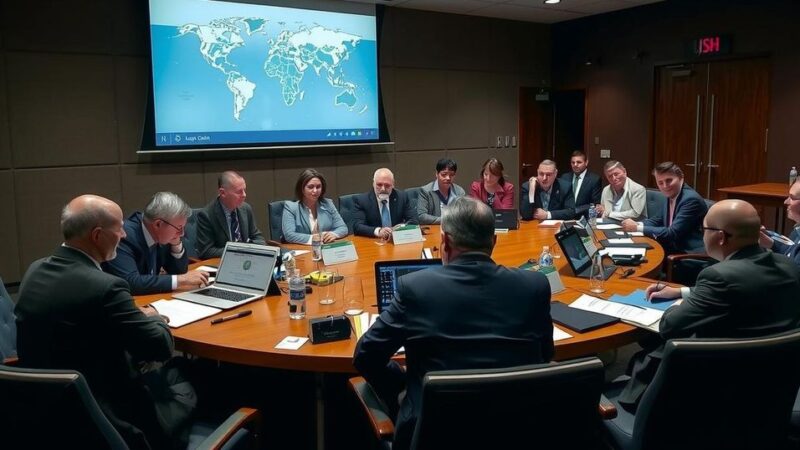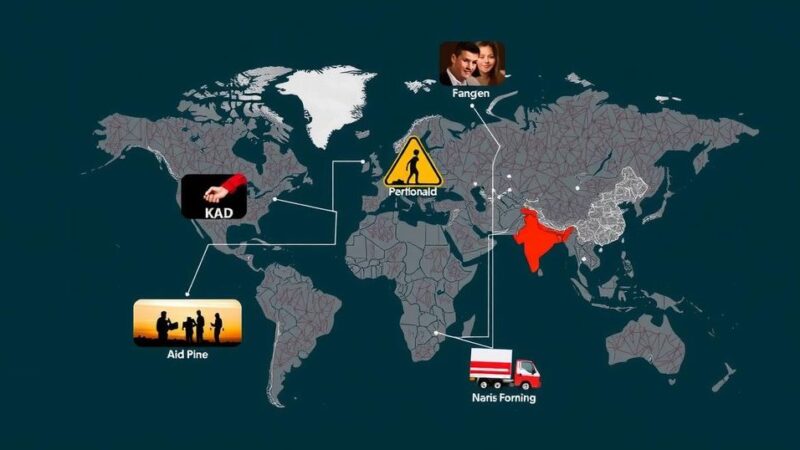Azerbaijan is leveraging the upcoming COP29 climate conference in Baku to finance the participation of small island developing states, possibly as a geopolitical maneuver against France. President Ilham Aliyev aims to amplify the voices of vulnerable nations while simultaneously addressing ongoing tensions with French President Emmanuel Macron related to the Nagorno-Karabakh conflict. This initiative signals a complex blend of altruism and geopolitical strategy.
Azerbaijan is introducing a geopolitical dimension to the forthcoming COP29 climate conference, primarily taking place in Baku in November. Azerbaijani President Ilham Aliyev recently announced a commitment to finance the participation of small island developing states, specifically aiming to challenge France’s influence, given that several of these nations maintain connections with France. This financial support is intended to cover expenses such as airfare, lodging, and daily stipends for up to four representatives from each participating island state. This initiative builds upon a previous proposal by Aliyev to establish a special fund targeted at aiding small island nations in their efforts to combat climate change. Azerbaijani officials frame this development as a noble gesture aimed at enhancing the representation of vulnerable nations significantly affected by global warming and rising sea levels. Azerbaijan’s Minister of Ecology, Mukhtar Babayev, emphasized the necessity of including voices from frontline communities in the COP29 discussions, asserting, “We need these perspectives and experiences to guide our approach and strongly believe in our moral duty to support these nations.” However, some analysts interpret this move as a strategic effort by Aliyev to provoke French President Emmanuel Macron amid ongoing tensions between Azerbaijan and France stemming from the Nagorno-Karabakh conflict. With France’s staunch support for Armenia in negotiations for a peace treaty with Azerbaijan, Aliyev’s government has retaliated by labeling French actions in the Pacific region as “neo-colonial.” This funding initiative for small island nations may serve to underscore Azerbaijan’s discontent with France while reinforcing the importance of addressing environmental issues related to island nations, as expressed by Aliyev himself. Earlier this year, Babayev participated in a significant meeting hosted by the island nation of Tonga, where representatives from 56 countries, including 33 island states, agreed to enhance climate action amongst themselves. Following this, Azerbaijan pledged $10 million towards initiatives that promote climate resilience and sustainable development for these island states. This geopolitical maneuvering was again highlighted during the recent session of the UN General Assembly, where President Macron reaffirmed France’s commitment to Armenia. Meanwhile, the Azerbaijani Foreign Ministry criticized France’s stance on the peace negotiations as “unconstructive.” Throughout these events, Babayev has reiterated the critical need for international support for small island states facing climate challenges.
The conflict between Azerbaijan and Armenia over the Nagorno-Karabakh region has been a significant geopolitical issue for several years, with France demonstrating consistent support for Armenia. This support has created tension between Azerbaijan and France, which Azerbaijan perceives as an adversary that impedes its territorial interests. The COP29 climate conference, scheduled for November in Baku, serves as a platform for global leaders to discuss environmental challenges. Azerbaijan’s initiative to fund the participation of small island developing states is strategically placed within the context of international diplomacy and its existing tensions with France, providing Azerbaijan an opportunity to potentially sway public attention towards its climate efforts rather than solely its geopolitical disputes.
In summary, Azerbaijan’s initiative to finance the participation of small island developing states at COP29 is a multifaceted approach that serves both humanitarian and geopolitical interests. While framed as an effort to enhance the voices of those affected by climate change, it simultaneously appears to be a strategic move by President Aliyev to assert influence and challenge French imperialistic narratives. As tensions between Azerbaijan and France continue, Azerbaijan’s actions at the upcoming climate conference will likely have broader implications for international relations in the region.
Original Source: eurasianet.org






